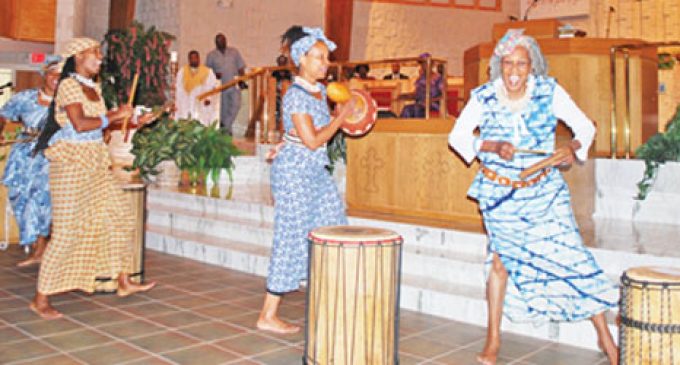Moving Forward by Going Back

Church recalls African Holocaust with series of special events
By Todd Luck
The Chronicle
Maafa is a longstanding tradition at Emmanuel Baptist Church. The annual weeklong slate of events commemorates the “African Holocaust,” a term used to describe the countless millions who died and suffered during slavery.
Pastor John Mendez brought the Maafa concept to his church more than a decade ago, inspired by Dr. Johnny Ray Youngblood’s program at St. Paul Community Baptist Church in Brooklyn, N.Y. Mendez, a New York native, said he felt that it was important, especially in the South with its ties to slavery, to remember the tragedy and its lingering impact on the black community.
“It’s the commemoration of the lives that were humiliated, stolen and lost during the Middle Passage,” Mendez said, describing Maafa. “And the millions that did not die, that did not jump over ship but chose to live, we are here because of them.”
The term “Maafa” comes from Dr. Marimba Ani’s book “Let the Circle be Unbroken: The Implications of African Spirituality in the Diaspora” and is a Kiswahili word that means “disaster.”
Nancy Dodd, who chaired the church’s Maafa committee, said the events offer African-Americans a chance to claim their history. She also believes it offers an opportunity for healing.
“We’re still trying to heal from the disaster that our ancestors suffered because that stems over to us,” she said.
Emmanuel held the culmination of this year’s Maafa events on Sunday during its morning worship service. For the occasion, the church’s lobby was decorated with African art and displays related to the slave trade.
During the service, which was themed “The Way Out is Back Through,” the all-female Mami Wata Cultural Arts Collective put on a powerful display of African dance and drumming, while longtime Emmanuel member Dr. Felicia Piggott Long honored the ancestors with a libation. Dr. Wendell Anthony, pastor of Detroit’s Fellowship Chapel, preached.
Anthony, who is also the eight-term president of the Detroit NAACP (the nation’s largest NAACP chapter), said that Maafa isn’t just about remembering hardships, but remembering how God blessed blacks by delivering them.
“Our children need to understand it, our seniors need to be appreciated for it, because we have come through it, we’ve got the blessings of God … he’s had his hand on our community all along this time period.” said Anthony, who also held a Maafa workshop on Saturday.
Anthony said the continued degradation of African-Americans, such as the disproportionate number of black men in prison, is a continuation of Maafa. He also said African-Americans can sometimes degrade themselves, citing blacks who took to Twitter to criticize the hair of two-time gold medal-winning gymnast Gabrielle Douglas.
Emmanuel’s Maafa week also included a presentation by psychologist/educator Dr. Ernest Howard Johnson and a black history skit staged by the youth of the church and written by Tenisha Fields.
On Saturday morning, congregants walked to nearby Salem Lake to place the names of their ancestors into a miniature boat that was set afloat. The symbolic sending-off ceremony was followed by a spiritual healing foot wash. Later on Saturday, the film “500 Years Later,” an award winning documentary that links the issues facing modern day African-Americans to slavery, was screened.
See more photos from the Maafa events at Emmanuel Baptist Church by visiting our Facebook:Moving Forward by Going Back












